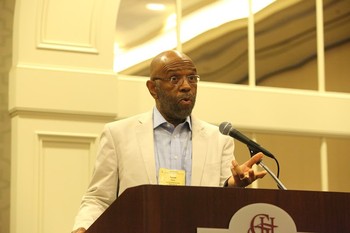Thinking the faith involves more than just the brain, Ronald Peters, president of the Interdenominational Theological Center in Atlanta told a luncheon crowd at the Theology, Worship, and Education Conference at Big Tent here.
“Thinking the faith takes more than cranial involvement,” Peters said. “It takes emotive involvement — the Holy Spirit — and it is best exemplified in our behavior.”
Peters’ talk was the first in a three-part series on the conference theme, “Thinking, Praying, Living the Faith.”
In the parable of the Good Samaritan, said Peters, Jesus tells about “three people who thought the faith correctly, but their actions didn’t measure up.” As a result, they missed an opportunity to act with compassion toward someone in need.
“Information submitted without any compassion or caring does not reflect the gospel of Jesus Christ,” Peters said.
“We have difficulty defining what faith in God actually is,” said Peters, noting that people tend to think that faith means believing in something they can’t prove.
Instead, he said, “faith perhaps is best defined in terms of the behavior it produces.” He noted that Hebrews 11 defines faith by giving examples of faith.
At the same time, Peters said, “I believe there is no conflict between faith in God and empirically verifiable data. Either the grave visited by Mary Magdalene was empty, or it wasn’t.”
The problem — especially for Presbyterians — comes when we give order priority over ardor, Peters said. “We have the verifiable data, the confessions, creeds, doctrines. The challenge is defining the outcomes of our faith.”
Big Tent, Aug. 1–3, is a celebration of Presbyterian Church (U.S.A.) mission and ministry organized around the theme “Putting God’s First Things First.” It’s composed of 10 national Presbyterian conferences, more than 160 workshops and special events to mark the 30th anniversary of the formation of the PC(USA) and the 25th anniversary of the opening of the Presbyterian Center here.

